book at best price
Start
here.
here.

06.09.2019
When I start to speak as someone from Lower Austria, the Viennese think I come from the region of the Waldviertel, the Carinthians think I am Viennese and the people from Vorarlberg think I am German. It is therefore not that easy to make oneself understood in Austria – even for us as natives amongst ourselves.
The people of Vorarlberg in the West, for example, understand us East Austrians very well (although they don't always want to), but they often look down a little on what in their ears is supposedly "Hochdütsch" (High German). But the Viennese don't really speak High German either (not even in the Burgtheater anymore), but rather a kind of colloquial language that can vary greatly between the Viennese districts and the surrounding area.
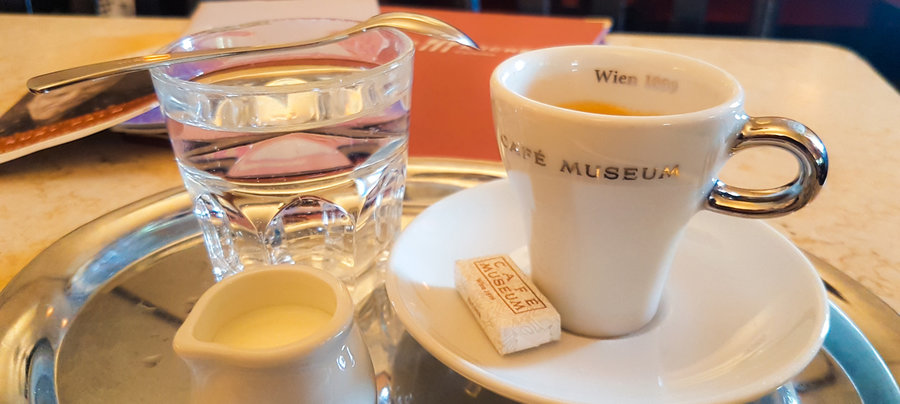
You can’t go wrong with a loud and polite “Grüß Gott”(roughly pronounced “Grews Got”) when entering a Viennese café.
Conversely, the Eastern Austrians rarely really understand their colleagues from the “Ländle” (Vorarlberg). Often we can only guess at what is being said. Styrians are said to like to "bark" when they talk, but they are understood by Austrians from all parts of the country. The Carinthian dialect is said to be the most likeable, but that alone doesn't stop me from being absolutely unable to phonetically follow entire speech sequences uttered by my mother-in-law from the Upper Drautal in Carinthia in the south of Austria. The Tyroleans, on the other hand, seem delightful to most people's ears because of their emphatically coughed out "KKK" and above all because they conjure up pictures of their high mountains, but as a real Viennese (and for the Tyroleans everything sounds like "Viennese" from Amstetten eastwards) you are out of favour in Tyrol quicker than a flash. The only thing that often helps is to keep your mouth shut.
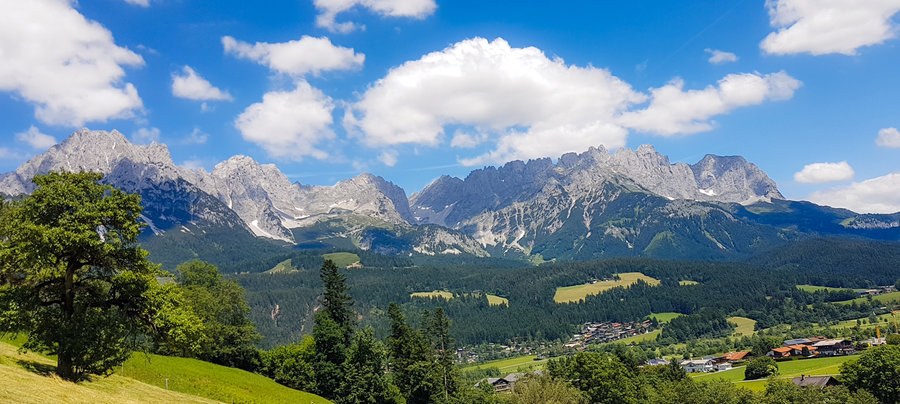
The Tyrolean dialect is popular – to listen to. It is more difficult to speak.
You can already see that it is not that easy here in the Alpine country – which, by the way, also has many flat spots, not only geographically. In high season you can travel just as long between the Marchfeld or Lake Neusiedl in the east and Lake Constance and the Bregenzerwald in the west as you can from Vienna to the sea to Croatia and these language barriers have to come from somewhere.
But if you don't understand the content of the conversation, you can still restrict yourself to a smile – perhaps enriched with an occasional "Aha!" or "Ah so?" – very often that's enough to contribute to the conversation anyway.
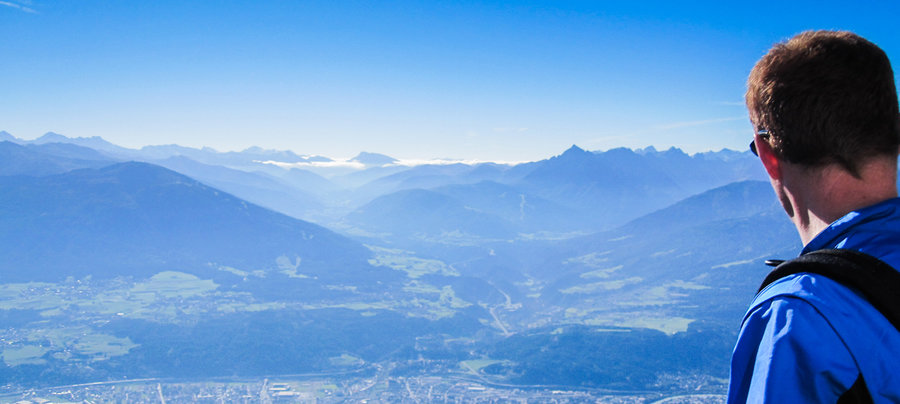
You have to be on informal “Du” terms in these mountains.
By the way, in Austria the "Busserln" (also called "Bussigeben" = giving a kiss on the cheek) is a communication tool that very quickly reveals which region the kisser comes from. Because in the far west one kisses – thanks to the proximity to Switzerland – three times alternately on the cheeks of the opposite party. The further east you go, the less frequent the kisses are. Vienna, on the other hand, is famous for the "Bussi-Bussi " society - but that would be too much for now. Let us now come to the simpler basic linguistic formulas of Austrian communication.

In Vienna you do not say the casual “Du” to anybody, unless you already know them. That is more usually the case 100 km to the west.
"It’s not enough just not to greet. You don't greet people you don’t know either." This sentence, of course, comes from the Viennese publicist and satirist Karl Kraus, is over 100 years old and applies especially in the urban regions of the eastern half of Austria: there it is clear what he means by this. We will try to make it simpler for everyone else.
The colloquial greeting formula which is used depends first and foremost on whether you are on “Sie” (formal) or “Du” (better acquainted) terms, a friend or just a relative, whether you live in the east, in the mountains, in the countryside or in Vorarlberg. A simple "good day" or "hello" is seldom enough. There is quite a science behind it. A lot of experience, tact and a little bit of intuition are necessary.

Grüß Gott, Servus, Baba – typical greetings in Vienna. No matter where you are in the city.
The well-known "Servus", which the Austrian airline has also stapled onto its wings – that is common both in the east and in the west, is understood and also accepted. But only if you are on “Du” terms. That's quite different from neighbouring Bavaria, where the way of speaking is often compared to the Austrian way and incomprehensibly even confused. But you can only confuse the Bavarian dialect with the Austrian if you are NOT a Bavarian or an Austrian. Although people from Vorarlberg sometimes find it difficult to distinguish between the Bavarian-German and the Viennese-Austrian tongues. But we have already discussed that.
"Servus" is therefore OK, but only if you are really friendly with somebody. For this you have to know each other already or to be in a common social environment, where you are automatically per “Du” without having been introduced to each other. For example fitness clubs, societies or Swedish furniture stores.
The universal "hello" is similarly simple to use, although some compromises must also be made here: on the one hand, the degree of politeness conveyed, because a rudimentary "hello" is not always considered business-like in Austria. Moreover, it lacks a certain acceptance amongst people, especially mothers over 60 - in their eyes it is often much too casual and even sloppy. "Good day" would be a good idea in business life, but it is not so accepted in Austria - unless you are moving in international corporate circles and show consideration for those German-speaking colleagues for whom the Austrian "Grüss Gott" (“godly greetings”) sounds too God-fearing and thus unacceptable.
This then brings us to the typical Austrian "Grüss Gott", which is used from east to west – if you are not yet on “Du” terms – but in certain gradations and dialect variants.
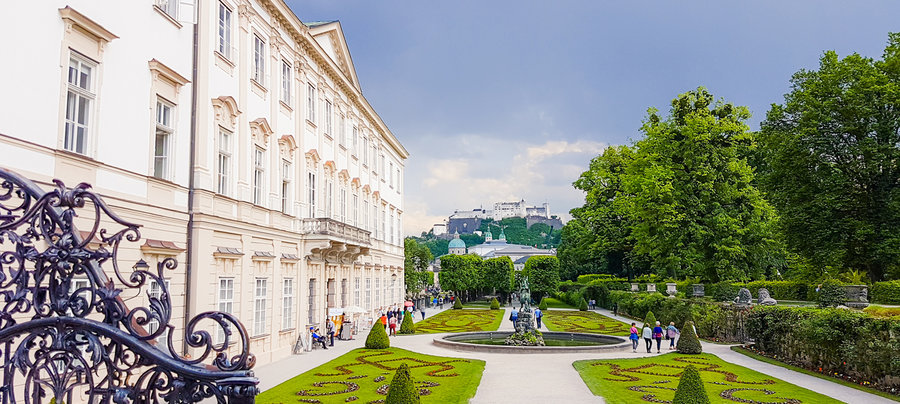
In the federal capitals – like here in Salzburg – a polite “Grüß Gott” is always correct.
“Grüss Gott” (if you are on formal “Sie” terms) – that is understood and used in the whole of Austria. If you are on friendly terms or in the country, you can also say “Griass di”. That is acceptable for all age groups, no matter if you have met before or not. But just away from the main cities – if you were to say it “Griass di” to someone on the cash till or in the bank in Vienna, you will probably receive a very grumpy response.
An hour or 100 kilometres west or south of Vienna, however, you can certainly say “Griass di" in the supermarket while buying a snack for you hike and will probably also have been greeted like that. You don't have to be at an altitude of more than 1000m in the mountains because there "Du" is used always and everywhere.
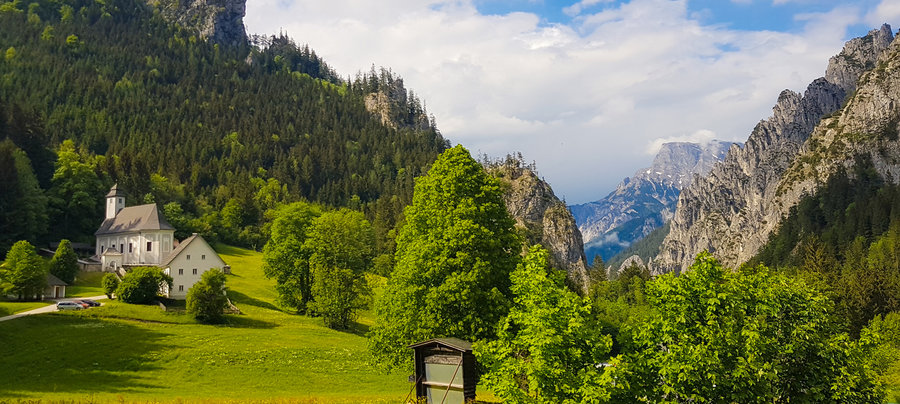
In Styria – like here in Gesäuse – people are very quickly on “Du” terms. Even below an altitude of 1000 metres.
"Griass Di" or "Griass Eich" in the plural is also a generally valid greeting in Tyrolean, Salzburg and Styrian dialects, but of course always sounds a bit different. "Griass Ihna" is a little bit spoofed and rather a version used in the belt of Lower Austria around Vienna, where one is not quite sure: friend or foe?
Also “Grüsse dich” or “Begrüsse dich” are acceptable variations of these. In Tyrol the whole thing is applied with a hearty "KK" to give "Griass Enk". It is similar in Carinthia, but less pithy.
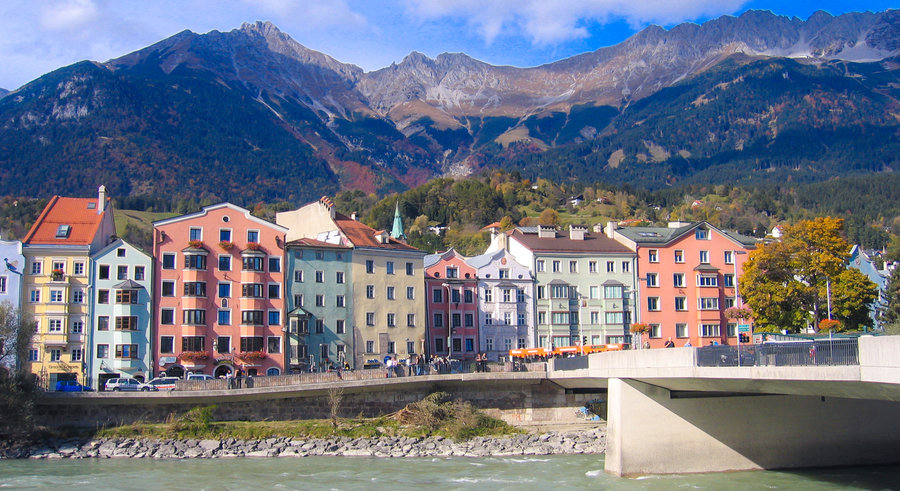
The Tyroleans – like here in Innsbruck – are famous for their pithy “K” sounds …
"Tschüss" was frowned upon for many years in Eastern Austria, but now seems to have gained acceptance since the Austrian kids have started using "You Tube-German", which sounds a bit like a mixture of German TV presenters, pop songs and artificial Burgtheater German. Those who use it, but are still a little embarrassed about it, turn it into a "Tschüssikovski", which lacks any sense of meaning, but (in Viennese ears or close to the German border) may sound quite funny.
Let's move on to the special cases, the exotic forms of greeting in Vorarlberg. These sound relatively strange even in eastern Austrian ears: "Heil" or "Heile" is used in Vorarlberg by all age groups and at all times of the day without any problems. But only the Tyroleans, who greet similarly, understand this. All other recipients of the greeting appear rather disturbed the first time they hear it: that doesn't have to be the case however because salvation and healing existed long before and long after Hitler. As long as it is not connected with unambiguous hand movements, it is a completely normal greeting formula. But the jovial Vorarlberg "Hoi" is still recommended as more harmless.
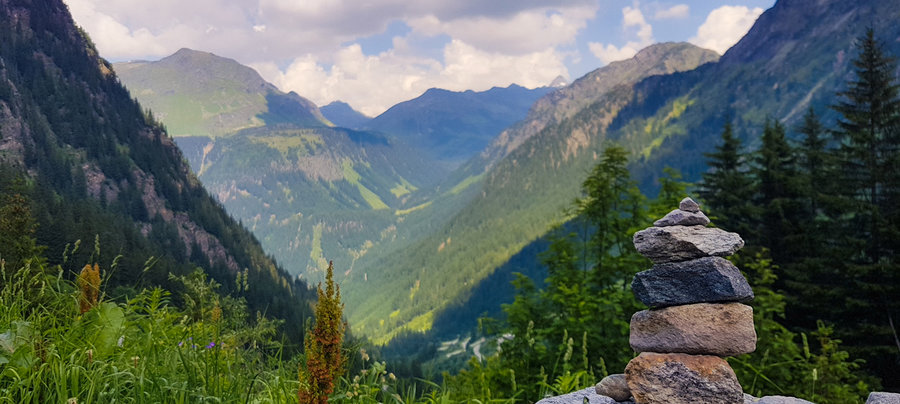
In Vorarlberg the greetings sometimes take getting used to. But you are allowed to kiss people on the cheek three times.
And what do you say in Austria when you say goodbye? "Auf Wiedersehen", "Wiederschaun", "Pfiat Di" or "Pfiat Eich" and "Pfiat Enk" and the annoying "Baba". No one outside of Vienna would voluntarily say "Baba" by the way; unfortunately it lacks acceptance everywhere except in the federal capital, even though if it may sound charming to German visitors.
"Servus" should not be confused with "Na serwas", an exclamation that expresses surprise and displeasure, but has nothing to do with a greeting. By the way, it is also quite modern at the moment to say goodbye with "Alles Liebe!" (“Lots of love!”), no matter if you knew each other at the beginning of the conversation or not. The plumber, who was recently in the house for five minutes just for a check, used these farewell words to me. I would have preferred “Habe die Ehre, gnä Frau” ("It was an honour, madam") – but those times are unfortunately long gone!
If you now feel you are technically prepared for your next stay in Austria, you are welcome to read the rules of etiquette for Vienna - have fun! ;)